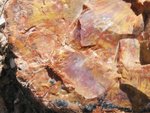My Alexander the Great Course has continued, and today the tapes discussed the Maccabeean revolt in 164 BC. I was astonished to learn that the Chanukah traditions and the Book of Maccabees only covered part of the story!
First, the basics. According to Jewish tradition and the Book of Maccabees, the evil Greek ruler Antiochus IV passed a decree preventing the Jews from practicing their traditions. Needless to say, the local religious community was not particular thrilled
about this. A family of religious brothers (the Maccabees) from the
from the small town of Modin organized a rebellion, killed Antiochus's general Nicanor, and
routed the Greek armies. They rededicated the Temple in Jerusalem (the Greeks had been
sacrificing pigs, worshiping Zeus, and doing other things which were contrary to Jewish
practice), and commemorated the event in the holiday of Chanukah. Everyone lived happily ever after. The tradition of giving gifts on Chanukah is derived from Christmas, and both holidays are likely derived from Saturnalia, a Roman winter solstice festival.
Here is what really happened, according to the Greek scholar on the tape.
Antiochus III, Antiochus IV's father, was actually a great friend of the Jews. He respected
the Jews' customs and reminded the Greeks not to desecrate the Temple. Antiochus was in
charge of the Seleucid Kingdom, one of the myriad kingdoms carved out of Alexander the
Great's conquests after Alexander's death. He considered Judea to be an autonomous,
relatively independent part of his kingdom.
That's when the Romans got involved.
The Romans started expanding into the eastern Mediterranean late in Antiochus III's
reign and defeated the Seleucids in battle. Antiochus III was forced to give up a large
chunk of his kingdom. Even worse, the Seleucid government was concerned that the
Romans would make an alliance with Ptolemaic Egypt, another Hellenistic kingdom.
Judea suddenly became a valuable buffer state between Egypt and Seleucia.
After Antiochus IV came to power, he took advantage of a minor ruling Egypt and tried to conquer the country. However, the Romans had become the power brokers of the region
by this point. A Roman soldier stepped in to protect Rome's possible ally and, quite simply,
bluffed Antiochus into stopping the invasion.
This left Antiochus in tough position. He had Rome on one side of his kingdom and Egypt on another. His eastern borders were also not particularly friendly. All Egypt needed to do to completely encircle Seleucia with a coalition of enemies was to take over Judea. Antiochus could not risk this, and as a result he determined to assume direct control over Judea. This would naturally
worsen Judeo-Seleucid relations, but Antiochus couldn't help it. He had no choice.
Antiochus realized that he would have to Hellenize Judea in order to maintain control over
the territory. This would help the Judean population assimilate into Seleucia and allow
the Greeks to establish a strong Greek government in the province. So, he started a major
Hellenization campaign, outlawing Jewish ritual and sacrificing pigs in the Temple.
The Hellenization campaign met with mixed reactions. Some people (including the
high priests of the Temple) took up Hellenistic culture enthusiastically. Other, more
traditional people, refused to go along with Antiochus's campaign.
As often the case with rural life, the people living in the Judean countryside were more traditional than those in the big cities. Most of the Greeks concentrated on the cities, and
as a result city dwellers were exposed to Hellenistic culture more often than country folk.
One day, a Greek came to the countryside town of Modin and urged Matthias, a prominent figure in the town, to adopt Greek customs. Matthias and his sons -- the future Maccabees -- refused. The issue should have ended there (the Greeks probably expected resistance).
However, at that point a townsman raced up to the Greeks' newly-erected altar to sacrifice
to the Greek gods. Matthias lost it and ran the townsman through (there is actually a
precedent for this in the Old Testament, where the zealot Phineas kills a community leader consorting with a non-Jewish woman in plain view of the community). Everything went
downhill from there and the revolt was on.
I won't go into the details of the revolt. Suffice it to say that guerrilla warfare is difficult
for any occupying power, and it was no different here. Eventually, the Maccabees win independence for Judea and rededicate the Temple. Obviously, the righteous have
triumphed and the Jewish tradition has survived the threat of Hellenization intact.
That's where the Chanukah story ends. History continues, however, and future events
reveal a startling different conclusion.
Realizing that he couldn't stop the Jewish rebels, Antiochus installed Jonathan, one of the
Maccabee brothers, as the Jewish high priest (was he even of the priestly caste?) to try to placate the Maccabees. This effectively put the Maccabees in charge of the kingdom, in a position of power.
Power corrupts.
Jonathan elected his son as his successor to the high priesthood. This was not unusual
in biblical times. However, when you're dealing with a man in charge of both church and
state here, it takes on another meaning: dynasty. The Hasmonean (Maccabee) dynasty
would go on for many, many, years.
Eventually, one of the Maccabee high priests became enamored of Hellenism and he
starts Hellenizing the community. He took on all the trappings of a Hellenistic ruler and
started abandoning orthodox Jewish traditions.
So there you have it. The Chanukah story talks about the Maccabees preserving Jewish
traditions and keeping Hellenistic forces from impacting Judea. What it doesn't say is that
the Maccabees eventually did their best to finish the job for Antiochus.
Subscribe to:
Post Comments (Atom)

No comments:
Post a Comment